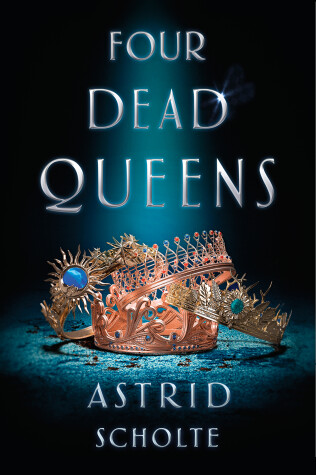Reviewed by Briana @ Pages Unbound on
I love a good high fantasy book, and Four Dead Queens was one of my most highly anticipated books of 2019. Everything from the summary (a fantasy murder mystery) to the cover (a pile of cards discarded like trash) is engaging and evocative. So I am immensely disappointed to report that this book was extremely underdeveloped and incohesive. I initially wanted to give it three stars but settled on two when I realized there are four main components of the book--a fantasy, a dystopian, a romance, and a mystery--and none of them really work.
The fantasy aspect might be the strongest--if you can overlook the completely absurd form of government (and apparently can, as has been demonstrated by very popular books like Three Dark Crowns.) I, however, cannot get over the fact there is a country with four queens who each rule a different quadrant, who claim to be acting "together" for the good of Quadara while actually deciding that nearly all the benefits of their quadrant must remain in that quadrant. (For example, only one quadrant can produce food. For some reason, they just give it away to the other three and accept the fact they're not "allowed" to have things like electricity from the technology quadrant to make farming easier. Why are they not rioting? Why are they not trying to withhold food to get what they want from the other quadrants? What army is enforcing all this?) Other inane rules include not allowing the queens to ever set food in their quadrant once they ascend the throne (not knowing anything about your quadrant helps you rule better, apparently), and all the queens must live in the same palace for their safety (because we all know the safest thing to do is to put all the most important people in the same place that can be taken out by a single major attack). The set-up of this country is, frankly, ludicrous, and I couldn't help thinking they basically deserved to have their queens murdered or couped or something so someone could set up a more stable government. Really the most shocking thing is that no one tried to murder all the queens before.
However, the book is not all high fantasy and court politics. Interestingly, there's a small dystopian angle when the protagonist discovers the seemingly utopian technology sector is actually a nightmare place that encourages conformity and tells people what jobs they "must" take to best use their skills in society. This, frankly, could have been an entire book on its own, and there is so much untapped potential here. I can envision this novel having gone in a Divergent direction where the characters learned that keeping the quadrants so separate was stupid and that they needed the good parts of the other quadrants to help keep them all in balance, but the author never really dealt with the obvious, deep-rooted problems of the country she created. She mentions this quadrant is actually a terrible place to live and then...kind of just moves one.
But is the romance good, you ask? No. No, it's not. The characters know each other literally for about three days. There is no time for them to convincingly develop feelings for each other, particularly when they are thrown together initially for work purposes and later because they want to help their country. They're basically two colleagues working towards the same goal, and there is no real chemistry between them at all.
So...the mystery. Also underwhelming. I suppose you can say there is a mystery in the sense that there is a murderer and that the characters and the reader do not know who it is, but this isn't exactly an Agatha Christie novel. There aren't really clues that lead the reader to help figure out who the criminal is. If you want to be super involved with this and try to figure out what's going on, you are going to be disappointed because a lot of the information you need is withheld (and also kind of...weird or incohesive with the rest of the story).
I so wanted to like this, and there was a ton of potential if Scholte had recognized some of the problems of the worldbuilding for Quadara and actually talked about them. If the lesson had been that everyone realized the government system was ridiculous or unstable, I think something could have been redeemed here. Instead, the book tried to do at least four different things and didn't do any of them well. and I am sadly completely unable to recommend this book.
Reading updates
- Started reading
- 8 March, 2019: Finished reading
- 8 March, 2019: Reviewed
